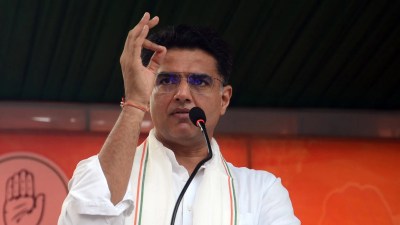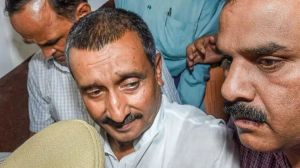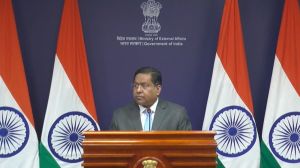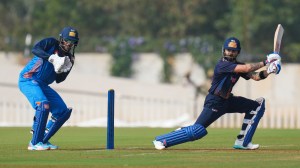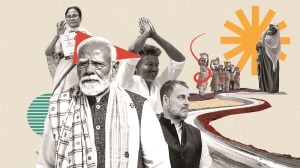Great expectations
On the eve of the current World Cup, a leading newspaper published a leading article on the larger significance, to India, of the competi...

On the eve of the current World Cup, a leading newspaper published a leading article on the larger significance, to India, of the competition. The author, a political analyst with cricket in the blood, argued that success in the tournament would make up for our failures in other spheres. He claimed that the victory, back in 1983, of Kapil Dev8217;s team was just what the nation needed to give its bloodied self-esteem something to cling on to8217;. And now, in 1999, the country is marked by rickety coalitions, economic recession, urban violence, civic despair; as was the case years ago, India is in frantic search of heroes who can cut through the power cuts and political turbulence. Azhar and his men could be the answer8217;.
The feelings were not unrepresentative, or new. I recall that at the time of the 1992 World Cup, editorials in more than one newspaper spoke of how victory in the tournament would be a vindication of In-dian secularism, then seriously threatened by the Ayodhya campaign. The fact that the teamcaptain was a Muslim, or that its members came from several different religions, was invoked in support of this thesis. Indeed, one energetic group in Bombay even printed posters featuring photo-graphs of four cricketers from four faiths, with the legend: If they can play together, why not we?8217;
This attempt to make of cricket a template of national identity and national self-respect begs several questions. First, does it not grossly overvalue cricket as a sphere of human activity? Second, does it not place an unfair and at times unbearable burden on the cricketers themselves? Third, does it not encourage a kind of escapism, where the more serious problems of Indian society are willingly brushed under the carpet?
Years ago, in his book The Middle Passage, V.S. Naipaul wrote of his native Trinidad that we were a nation without any heroes 8212; except cricketers8217;. But in this land of a billion people and a million causes, that is certainly not the case. Were India, or Indians, having a problem withself-esteem numerous remedies are at hand, numerous individuals whose luminous example shall help us forget about the power cuts and the political turbulence. Consider, as selfless social workers, the names of Baba Amte and Chandi Prasad Bhatt. Or, as performers who have ennobled and enriched the great heritage of Indian classical music, the names of M.S. Subbulakshmi, Bismillah Khan, and Pandit Ravi Shankar. Film-makers, journalists, writers, activists 8212; in these domains too one can think of many people whose work and example mock the claim that Indians are mediocre, corrupt, or selfcentred. One might think also of organisations rather than individuals, such as the Peoples Union for Democratic Rights PUDR and the Kerala Sastra Sahitya Parishad KSSP. Our netas may daily violate the norms and procedures of democracy, but the PUDR and the KSSP do much to deepen its spirit. With this wide range of heroes and heroines to choose from, why confine oneself to cricketers? That in our search for heroes we thinkfirst and often solely of cricketers is a comment on how debased our cultural standards have now become.
This idealisation of cricketers is also deeply unfair to the players themselves. In 1992, when northern India was wracked by a series of Hindu-Muslim riots, the Indian World Cup team was asked to make amends for a communal conflict they had not by a long stretch themselves initiated. Seven years and two tournaments later, the hope was that their performance in England would help us forget failures in governance for which they were not at all responsible. In making these demands on the players we seem to have lost all sense of proportion and perspective. For these are lads in their twenties, with a particular talent with bat or ball, that8217;s all.
Of Sachin Tendulkar it has been said that no other person at no other time in history has had so many hopes pl-aced on him. The burdens on his teammates are only marginally lo-wer. I think especially of Mohammed Azharud-din who by the mere accident ofreligious affiliation has, for some time now, been dragged into the great secularism/ ps-eudo-secularism deba-te. On the one side, the secularists insist on vie-wing him as a symbol of their faith; on the other side, the communalists disparage him as well as his community by referring to Azhar as a rare nationalist Muslim8217;.
The real problems with these exaggerated expectations come to the fore when the Indian cricket team loses. The feelings of betrayal are spectacularly expressed, through abuse, innuendo and as at Hove the other day or Calcutta the day before physical violence. This dreadful scapegoating has its origins in our demand that the cricketers redeem individual or collective failures in spheres other than cricket. But why should these 15 boys have to make up, on the playing field, for what the rest of us have failed to do outside it?
In investing this hegemonic significance to a mere sport, both analysts and fans are seeking an easy answer to serious social problems. For the solution toreligious sectarianism is not cricketing success. It requires, instead, the firm enforcement of law by the organs of the state, and the patient building of trust and the countering of propaganda by groups in civil society. Likewise, a victory in a cricket match even if it be the final of the World Cup cannot wish away the need to build stable political alliances or put into practice a poverty-reducing economic policy.
Ironically, this promotion of cricket to a status way beyond its due has grievously affected the game itself. One important reason for the mediocre record of the Indian team is that they play too much. Sharjah one week, Toronto the next, Sydney the third 8212; all this because we are being coached to think that international cricket is the single most important activity for India and Indians. Other teams, which pace themselves by playing fewer matches, also perform vastly better. Both South Africa and Australia play less than half the one-day matches annually than do the Indians.
The lossesin the current World Cup might inspire the Indian Cricket Board to finally place performance above profit, by scheduling less matches in future. The rest of us, meanwhile, can help by putting cricket in its proper place, by putting it, so to say, on the back pages. No longer should it be viewed as the summation of social success, as a ready substitute for all that we have failed to do in politics and economics. The road to national salvation does not lie through sport.
The author is a sociologist and cricket writer
- 01
- 02
- 03
- 04
- 05


